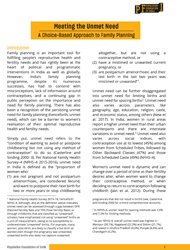 Family planning is an important tool for fulfilling people’s reproductive health and fertility needs and has rightly been at the heart of political and programmatic interventions in India as well as globally. However, India’s family planning programme, despite its numerous successes, has had to contend with misconceptions, lack of information around contraceptives, and a continuing gap in public perception on the importance and need for family planning. There has also been a recognition of the persisting unmet need for family planning (henceforth, unmet need), which can be a barrier to women’s realisation of their optimal reproductive health and fertility needs.
Family planning is an important tool for fulfilling people’s reproductive health and fertility needs and has rightly been at the heart of political and programmatic interventions in India as well as globally. However, India’s family planning programme, despite its numerous successes, has had to contend with misconceptions, lack of information around contraceptives, and a continuing gap in public perception on the importance and need for family planning. There has also been a recognition of the persisting unmet need for family planning (henceforth, unmet need), which can be a barrier to women’s realisation of their optimal reproductive health and fertility needs.
Simply put, unmet need refers to the “condition of wanting to avoid or postpone childbearing but not using any method of contraception” to do so (Casterline and Sinding 2000: 3). Per National Family Health Survey–4 (NFHS–4 2015-2016), unmet need in India is defined as the “proportion of women who:
(1) are not pregnant and not postpartum amenorrhoeic, are considered fecund, and want to postpone their next birth for two or more years or stop childbearing altogether, but are not using a contraceptive method, or (2) have a mistimed or unwanted current pregnancy, or (3) are postpartum amenorrhoeic and their last birth in the last two years was mistimed or unwanted”
Unmet need can be further disaggregated into unmet need for limiting births and unmet need for spacing births2 . Unmet need also varies across parameters, like geography, age, education, religion, caste, and economic status, among others (New et al. 2017). In India, women in rural areas report a higher unmet need than their urban counterparts and there are interstate variations in unmet need.3 Unmet need also varies across social indices, with contraception use at its lowest (45%) among women from Scheduled Tribes, followed by Other Backward Classes (47%) and those from Scheduled Caste (49%) (NFHS–4).
Women’s unmet need is dynamic and can change over a period of time as their fertility desires alter, when women want to change their contraceptive method, or when deciding to return to contraception following childbirth (Jain et al. 2012). During these phases, women’s met need may convert into unmet need if the period of contraceptive non-use is prolonged due to factors like inability to access quality care, find contraceptives that match their needs and desires, or if women are unable to get quality counselling to help them with their contraceptive choices. Various global studies have documented such conversion–of met need into unmet need–particularly due to contraceptive discontinuation, which can subsequently lead to unwanted fertility and childbirths (Jain et al. 2014; Casterline et al. 2004).
This paper examines factors that contribute to unmet need in India and proposes a choice-based approach while formulating and implementing family planning policies and programmes. Following in the footsteps of the approach put forth during the International Conference on Population and Development (ICPD), the choice-based approach recognises that women have different choices and individual preferences for their fertility, family planning and contraceptive use, and aims to build policies and programmes that ensure that women have options to choose from, accurate and complete information to facilitate their choice, and the freedom to exercise their choice. This paper ends with specific recommendations that can uphold and engender choice in developing and strengthening programmes and policies in India to reduce the unmet need and addressing social and cultural determinants of meeting unmet need.